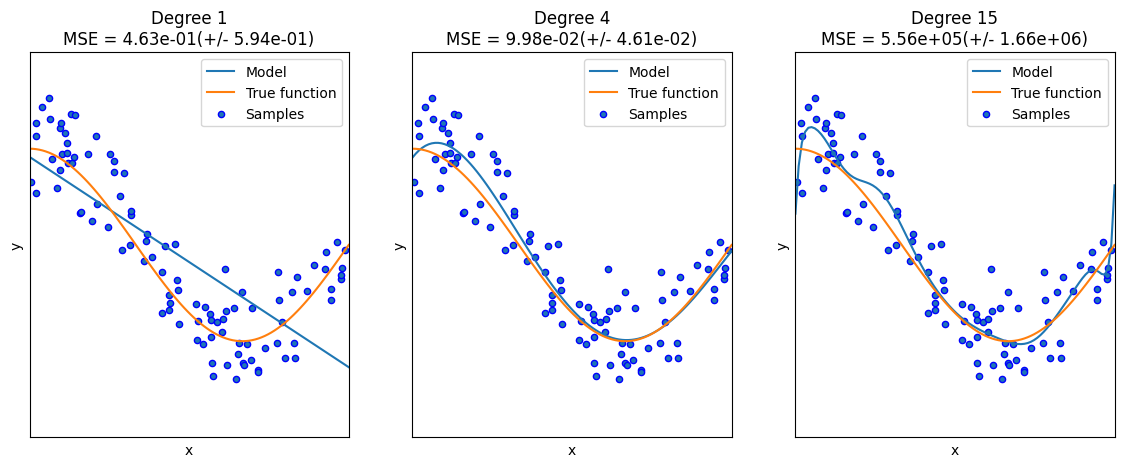📝 Overfitting#

This might be a comfy bed for you, but I don’t know if your friend would like to sleep on it ☺️
It is possible to get perfect accuracy on a test set but cannot conduct inference on a new problem
The model is not generalizable
A model can classify types of apples but show it an orange and it is useless
Overfitting Example with Polynomials#
import numpy as np
import matplotlib.pyplot as plt
from sklearn.pipeline import Pipeline
from sklearn.preprocessing import PolynomialFeatures
from sklearn.linear_model import LinearRegression
from sklearn.model_selection import cross_val_score
# Defines the function
def true_fun(X):
return np.cos(1.5 * np.pi * X)
# sets a random seed for consistent plotting
np.random.seed(0)
# sets the number of samples
n_samples = 100
# Sets the range in degrees
degrees = [1, 4, 15]
# adds some noise to the data
X = np.sort(np.random.rand(n_samples))
y = true_fun(X) + np.random.randn(n_samples) * 0.3
# does the plotting
plt.figure(figsize=(14, 5))
# Loops around the number of degrees selected
for i in range(len(degrees)):
# makes the subplot
ax = plt.subplot(1, len(degrees), i + 1)
plt.setp(ax, xticks=(), yticks=())
# creates the polynomial
polynomial_features = PolynomialFeatures(degree=degrees[i], include_bias=False)
# Least squares linear regression
linear_regression = LinearRegression()
# establishes a fitting pipeline
pipeline = Pipeline(
[
("polynomial_features", polynomial_features),
("linear_regression", linear_regression),
]
)
# does the fit
pipeline.fit(X[:, np.newaxis], y)
# Evaluate the models using crossvalidation
scores = cross_val_score(
pipeline, X[:, np.newaxis], y, scoring="neg_mean_squared_error", cv=10
)
# Defines a linear vector
X_test = np.linspace(0, 1, 100)
# plots the real model
plt.plot(X_test, pipeline.predict(X_test[:, np.newaxis]), label="Model")
plt.plot(X_test, true_fun(X_test), label="True function")
# plots the generated data
plt.scatter(X, y, edgecolor="b", s=20, label="Samples")
# sets the axes format
plt.xlabel("x")
plt.ylabel("y")
plt.xlim((0, 1))
plt.ylim((-2, 2))
plt.legend(loc="best")
plt.title(
"Degree {}\nMSE = {:.2e}(+/- {:.2e})".format(
degrees[i], -scores.mean(), scores.std()
)
)


